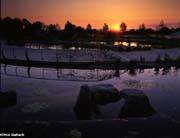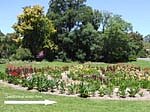|
We thank Rainer Gaide, David Curtright, Michael Avishai, Fran Bennett, and Charles Leach for their advice and assistance in preparing this article, and welcome additional suggestions and comments. Write kit@victoria-adventure.org Some of the links below are to articles in WGI Online, the journal of Water Gardeners International. Most issues are for members only but selected issues and articles are open to the public. Joining WGI is free, no strings attached, if you'd like to read those articles reserved for members. |
||
 |
One Pond at a Time Click images to enlarge |
|
|
As we all become more aware of environmental issues facing our planet, water gardening can help! Not only can we plant a tree or give more space to our gardens regardless of where we live, but also water gardens and water gardeners can contribute in many ways. Ponds, indeed all waterways, are living entities and as their keepers it is our job to keep them healthy. Who Should and Who Shouldn't? Water is precious. In some parts of the world and at certain times of the year, having a pond for strictly ornamental purposes may not be the best use of it. If you live in an arid or seasonally arid climate and have or want a pond, you might consider making it productive as well as ornamental. Grow a food crop, adopt an endangered species, share your results. Rainer Gaide, a commercial grower of waterlilies in Thailand
says, "Thoughtless use takes water away from where it is
needed most, like irrigation for food plants, other plants and
of course for use by people for their daily lives, especially
in places where water is in short supply like Australia, Africa
and some regions in Asia. Pond Health Ponds and waterways breathe, absorbing oxygen during the day and replacing it at night. Unhealthy ponds can use more oxygen than they replace, hazardous to the planet and to aquatic inhabitants. Pond health is best achieved through natural balance, without the use of chemicals or extensive hardware. |
||
|
The very first green thing we can do as pond owners is to balance our ponds. Balance is accomplished with the right number and types of aquatic plants, fish, snails, beneficial bacteria and algae. The Sustainable Pond by Jamie Vande, Germany |
 |
|
|
Energy Reduction Ponds can be power hogs if you have elaborate filters, skimmers, pumps. With natural balance, much of this is not necessary, saving energy and money. If you must have these bells and whistles, explore those powered by alternative sources such as solar. A wide variety of pumps and lights are available powered by the sun and LED lighting makes your evening experience even more rewarding by reducing energy consumption. See Joel Police's article about pond lighting here. No Chemicals! Using chemicals to keep ponds clear is ABSOLUTELY not necessary! Again natural balance is the best answer. This is true in any climate and any type of pond. Before you open a bottle that can have ramifications even beyond your personal pond, do some research or simply add more plants! For control of insects that can attack pond plants, natural remedies are available. Thorough hosing of affected plants is often enough but if not see Pat Clifford's articles in WGI Online for other ideas. Properly stocked ponds can reduce or eliminate nearby mosquito populations as fish eat the larvae, a bonus in wet climates. |
|
Prudent Use of Water for Ponds Leaks are not the only waste of pond water. David Curtright, California USA, addresses these issues in this article. He identifies problems and offers solutions. Joel Police, Indiana USA, discussed this from an installers point of view. The choices you make when planning your pond can mean everything to its eco-friendliness. See WGI Online 4.1. |
 Lotus growing experiments at Auburn University |
Aquatic Food Crops Rice is the most important food crop for half the world's population - and it grows in water. Lotus is an important crop in Asia and China especially. Daike Tian explores the many values of lotus, as well as its crop value, potentially in conjunction with fish farming, in WGI Online. Waterlilies are food in parts of Africa, though wild and not cultivated for this purpose. |
|
| Pollution Remedies | ||
 Saaman Grove, Tobago |
On the cutting edge of greening, projects large and small are being designed especially to clean water contaminated with sewage and other pollutants using aquatic plants as natural filters. An amazing example is Saaman Grove in Tobago. Not only has Kevin Kenny cleaned water that has threatened Tobago's coral reefs, he has created beautiful waterways that enhance the value of the site, AND (unexpectedly) made a profit for the developers. In WGI Online read about The Saaman Grove Wetlands | |
 |
||
|
The Oregon Garden has pioneered methods for utilizing and additionally cleaning treated wastewater of Silverton, Oregon, USA, through their terraced wetlands. Theirs was the first cover story of WGI Online. The Oregon Garden Wetlands The Oregon Garden at sunset > |
||
|
Soak It Up, Phytotechnology Solutions for Water Challenges The Oregon Garden, Silverton, Oregon |
||
|
Grey Water Recycling Grey water (household water used for washing people, dishes, clothes), when it can be separated from sewer water, can be recycled for the same purpose using pond plants to filter the impurities and excess nutrients out of it. More on this topic is coming soon. Storm Water Reclamation Why do retention ponds, required for new development in the US and elsewhere, have to be square, ugly and polluted? They don't! The potential for beautiful, healthy, productive ponds is enormous! Fran Bennett, Florida USA, says, "The water gardener's first contribution can be providing information about plant material -- what needs permanent flooding, of what depth, what type of plants can tolerate a more ephemeral wetland -- that sort of thing. At the University of Florida's Center for Wetlands, they also touch on the contribution of these 'mini' man-made wetlands as stopping points, or stepping stones for wetland critters that are otherwise displaced by the development of land and draining of natural wetlands." |
||

|
The Royal Botanic Gardens Melbourne, Australia, has a new Raingarden that substantially improves the water quality of its lake system by processing street runoff in a very pretty setting. Read Jeremy Prentice's article in WGI Online. < Cannas help filter RBG Melbourne's Raingarden |
|
|
Habitat for Plants and Animals Healthy ponds and waterways provide homes or waypoints for many creatures, not just those that live in water. Again the Saaman Grove project illustrates the point. In some cases, they are home to threatened and endangered species. Michael Avishai, Jerusalem Botanical Garden, Israel, says, "Many aquatics are considered most promising for water purification -- and this aspect deserves certainly a place in our thoughts and plans. In my own botanical garden we are currently planning a facility that will address this aspect as part of an educational project while at the same time also providing the setting for the conservation of our rare aquatics as well as some rare native fish (Aphanius mento). In Romania, unusual thermal springs are home to a tropical night blooming waterlily, Nymphaea lotus forma thermalis as well as the equally rare snail Melanopsis parreyssi and the fish Scardinus racovitzae. Read about efforts to conserve this unique ecosystem written by Ana Veler in WGI Online. Too many people release unwanted animals and plants that into the natural environment, thinking they are doing them a favor by not killing them. Instead, they threaten natural habitats with aliens, including waterways. This has to stop, but can only be accomplished with education. |
|
Invasive Aquatic Plants . . . are the scourge of some personal ponds and many wild waterways. Whether native or alien, they can destroy habitats and local economies. Our responsibilities are multiple here. |
||
| First, we can help by disseminating information by all possible means about these invasive species. Read The Aliens Are Coming! or Responsible Water Gardening Without Invasives by Larry Maupin, USA. He calls Salvinia molesta "the world's worst weed". John Dawes, United Kingdom and Spain, is a crusader against Eichhornia crassipes (water hyacinth) and writes about the destruction it can cause in WGI Online here and here. |
 Salvinia molesta |
|
|
Next, we can not grow them. If we do, we can be VERY careful not to allow them to spread. Charles Leach, Ohio USA, removes seed heads, plucks possible seedlings, and discourages customers for looking for potential invaders, however pretty. A difficulty with many invasive species is that what is invasive in one place may not be a problem in other locales. Charles Leach has undertaken a project to identify native wetland plants in his area for use in water and bog garden IN PLACE OF more invasive native and alien plants. Look for his series in this and future issues of WGI Online. And we invite others to contribute information about invasives in their waterways. We can also participate in manual removal of invasives and/or participate in research leading to their eradication where we live. Every small effort helps. |
||
|
Botanic Gardens Go Green This may be more difficult for established gardens but a relatively new garden in Malaysia is one of the world's eco-friendliest destinations. Look for a full feature on Penang's Tropical Spice Garden in WGI Online. Here is an excerpt from their website: |
 Tropical Spice Garden |
|
|
"Tropical Spice Garden is more than just a garden, we're a small group of environmentally and socially-aware individuals trying to make a difference.
|
||
 |
Swimming Ponds Swimming ponds are gaining in popularity in Europe, South America and to some degree in the USA. These multipurpose pools/ponds combine swimming area with plants and fish providing balance and clean water without the use of chemicals otherwise required in swimming pools. And they can be SO pretty! Renowned photographer Derek Fell has one, featured in WGI Online. |
|
|
Golf Course Ponds Measures are being undertaken to make water features on golf courses all over the world more eco-friendly. Many are sterile and thereby rob the planet of what could otherwise be beautiful and useful. Alvaro Hurtado writes about a huge undertaking in Guatemala (WGI Online) and Joe Tomocik will have new information about golf course projects in Colorado USA in upcoming issues of WGI Online. |
 |
Recycling Nursery Plastic Dave Brigante suggests we conquer personal mountains of recyclable plastic used by nurseries and individuals. A new company near Hughes Water Gardens in Oregon USA blazes the way. Read about this in WGI Online. |
|
|
Physical and Mental Health Those of us who have water gardens or appreciate our natural waterways know how soothing water can be. Between the pleasant work of tending them and the stress relief, who knows? Maybe we are also contributing to lower medical costs, another crisis yet to be solved. |